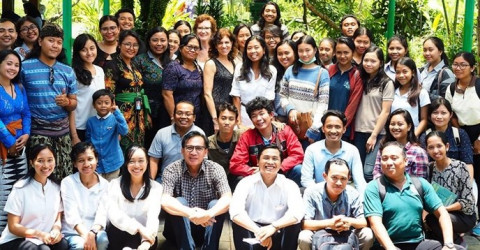
GCED Basic Search Form
Quick Search
أنت هنا
الأخبار

BASAbali from Indonesia is awarded the 2019 UNESCO Confucius Prize for Literacy for its programme ‘BASAbali Wiki’.
Based on a collaboration of scholars, governments, artists, and community members from within and outside of Bali, BASAbali was created as a digital tool to both preserve local languages and strengthen them by transforming people’s attitudes towards promoting and valuing linguistic diversity.
The tool, BASAbali Wiki, is a multimedia, multilingual (Balinese-Indonesian-English) wiki dictionary, encyclopedia and virtual library which intends to revitalize endangered local languages by creating the sense of ownership.
Both local Balinese and international communities are invited to contribute to creating the content in whatever way they can in local, national, and international languages. A team of experts contributes to monitoring the relevance and quality of the content.
“We realized that to foster literacy, particularly with local languages, we need to do more than just create a body of resources: we needed to engage civil society in developing a norm of literacy and multilingualism”, says Gde Nala Antara, the Chair of the BASAbali Wiki Board.
Read to a child in a local language
Since the launch in 2011 with interfaces in Balinese, Indonesian and English, BASAbali Wiki has been used by over half a million people.
The main target group of the programme is younger generations, especially young women and girls.
“Outreach teams particularly target out-of-school youth, women and girls, and those who may be outside the grid but can nonetheless add and use content through an offline function”, says Gde Nala Antara.
“Our goal is to have the grandchildren of this generation’s children value literacy and multilingualism. We target children directly, teens and young adults as role models for their younger peers, and young parents who can create an environment of reading, writing , and using local, national and international languages”, says the director of BASAbili Wiki.
When material is submitted in one language, users are encouraged to offer translated text in the other two languages. In this way, BASAbali Wiki serves as both a Balinese reference and a translation tool for Indonesian and English languages. The team of experts also provides translation and editing assistance when needed.
Over the last five years, BASAbali has succeeded in getting a significant number of young parents, millennials and children involved in the initiative.
BASAbali now wants to share the initiative with other language communities, while expanding their dictionary and virtual library, with special focus on youth, girls and underserved communities. Other project plans include creating multilingual books featuring a teen environmental superhero imagined by the children of Bali.
To celebrate International Literacy Day, Gde Nala Antara wants to share a simple message: “Give a lasting gift: read to a child in a local language.”
This year’s UNESCO International Literacy Prizes will be awarded to laureates from Algeria, Colombia, Indonesia, Italy and Senegal on the occasion of International Literacy Day. The Prize Award Ceremony will take place during the global event for International Literacy Day on 9 September at UNESCO Headquarters. This year’s International Literacy Prizes and global event are organized around the theme of ‘literacy and multilingualism’.
Read more:
URL:
